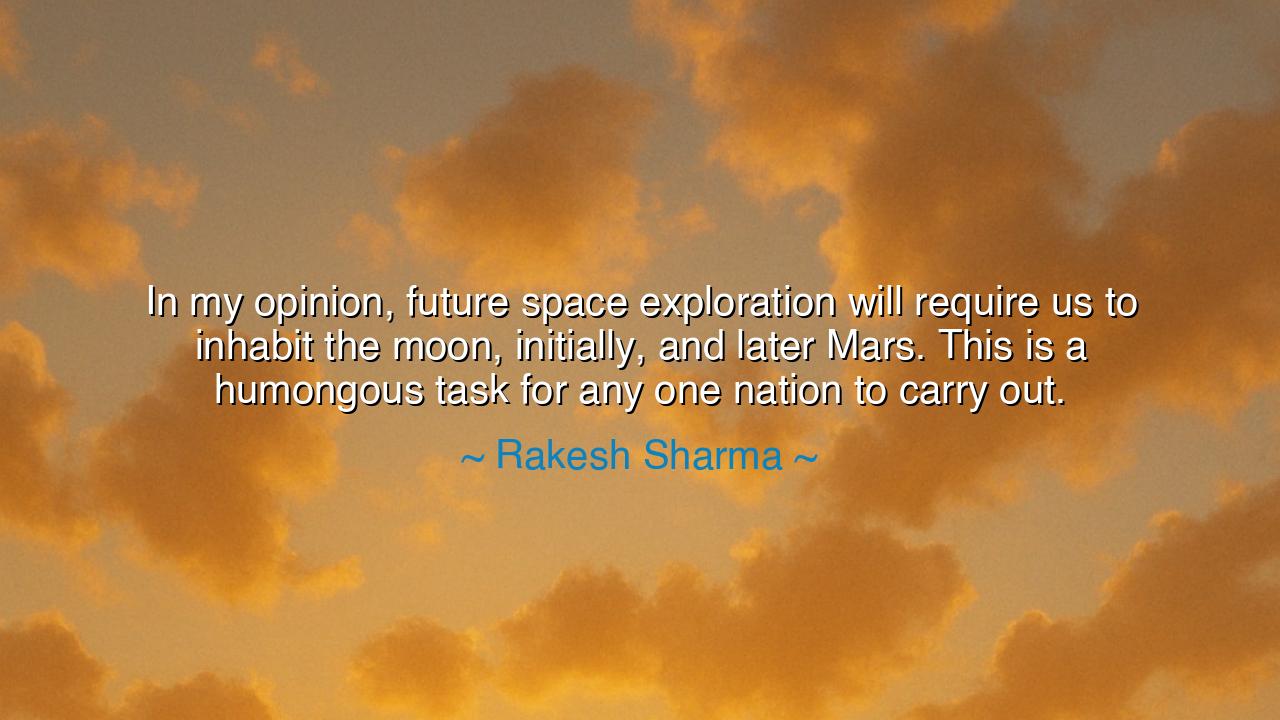
In my opinion, future space exploration will require us to
In my opinion, future space exploration will require us to inhabit the moon, initially, and later Mars. This is a humongous task for any one nation to carry out.






Long ago, the ancients looked to the sky with wonder, their eyes drawn to the celestial bodies that hung in the night like jewels upon the fabric of the universe. These stars, these far-off realms, were not just objects of beauty but symbols of human aspiration—a reminder that the path of discovery is not confined to the earth beneath our feet, but stretches across the vast and unknown reaches of the heavens. And so it is that, in the words of Rakesh Sharma, we hear the echo of a truth that resonates with the spirit of every adventurer and explorer who has ever dared to venture beyond the familiar: “In my opinion, future space exploration will require us to inhabit the moon, initially, and later Mars. This is a humongous task for any one nation to carry out.”
As the moon circled above our ancestors, it was a beacon of the impossible—a challenge far beyond the grasp of mortal hands. But now, in the modern age, the question is no longer about merely gazing up in awe. We have moved beyond the dream of simply observing the heavens, to the audacious pursuit of making the heavens our home. Sharma’s words speak to a truth, one that has long been known to wise leaders and dreamers alike: exploration requires collective strength, not the efforts of any one nation, but of all humanity. The moon and Mars, those distant worlds, will not be conquered by a solitary force but by a united effort, forged through collaboration, knowledge, and unyielding determination.
This is not a new truth. Long before the stars were mapped and the moon landed upon, great empires strove to extend their dominion across vast seas and into unknown lands. Alexander the Great, in his boundless ambition, sought to create an empire that spanned the earth, believing that no distance was too far, no challenge too great. Yet, even his mighty army, though powerful and vast, could not conquer all alone. In the same vein, Sharma's words remind us that no single nation can carry the weight of such a monumental task as colonizing the moon or Mars. It is a task that demands unity, for the magnitude of the challenge requires not just the strength of one but the wisdom and cooperation of all.
Look to the ancient pyramids of Egypt—monuments of human ingenuity that towered above the earth, yet were built not by the hands of one man, but through the labor of many, each bringing their skill, their sweat, and their determination to the task. So too must the vision of space exploration be approached: with a shared understanding that while the destination may be far, the journey itself is a collective one. It is not the effort of a lone nation, but the combined strength of all peoples who must come together to face the unknown.
The moon—a pale reflection of our world—represents the first step. It is a challenge that is immense, but still within our reach. The great unknown of Mars, however, looms beyond, like the uncharted wilderness that called to the explorers of the past. Yet, as the ancients crossed untraveled seas, so too must we venture into the unknown skies. To achieve this, we must understand that the road ahead will be long and fraught with uncertainty, requiring not just innovation and technology, but a deep commitment to unity and collaboration. If humanity is to step foot on Mars, we must do so together, bringing the very best of what we are to the task.
The lesson that Rakesh Sharma’s words impart is this: greatness is born not in isolation, but in unity. The challenges that lie ahead are not simply technological—they are human. To face them, we must build alliances that cross borders, transcend differences, and focus on the common goal of expanding the reach of humanity into the stars. This is the true spirit of exploration, the same spirit that fueled the great empires, the same spirit that propelled our ancestors to look beyond their horizons and dream of distant lands.
As we look to the future, we must remember that the journey to the moon and Mars is not for one nation to carry alone. It is a call to all of humanity—a call to unite in the face of adversity and to strive for a future beyond our own. It is a lesson that we must take to heart: in the vastness of the universe, the strength of a single nation is but a whisper, but the power of united humanity can shake the heavens themselves. Let us walk this path together, for only then will we reach the stars.






AAdministratorAdministrator
Welcome, honored guests. Please leave a comment, we will respond soon